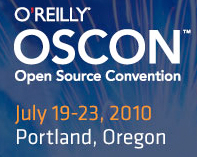OSCON highlights rising expectations


The answer is that the users won. Ordinary users like you and me are all big winners because open source has cut the cost of basic software to near-zero.
While the margins in some niches (like my other beat of health care) remain fat enough to hold off open source's advance in the short term, that's only the short term.
The biggest winners, however, turn out to be the biggest users. Most of this year's main speakers come from Google, but other companies that have shared development costs and used open source to create profitable products and services have also won in the market.
Developers win the awards, which are well deserved, but it's corporations that make the money. Making money remains a popular OSCON theme, with people like Marten Mickos (formerly mySQL, now Eucalytus) hailed as heroes and new projects like DBRelay announced in hopes of emulating Mickos' success.
Non-developers are reminded of their responsibility to pick up the poop -- find what's wrong and test the fixes -- but it's also our responsibility to keep compressing margins, making new demands on the biggest winners for more personal power.
That was the real bottom line of Stormy Peters' speech yesterday. (Most reporters focused on her "poop" comment.) Web services like Facebook are taking far more than they are giving, replacing the proprietary advantage of code with control over user data, she said.
Services can cut users off from their data at a stroke, and retain full ownership rights to what users created, she said. Freedom for code must be followed by freedom for data.
That point reaches far beyond Facebook and its 500 million users, however. It should also reach to hardware companies like HP, which had a major presence at the show to push Palm's webOS. Who controls your apps, if hardware makers can shut them down remotely and carriers can refuse service for alleged Terms of Service (TOS) violations?
These are far more difficult questions than those open source has faced to date. Most users are always focused on free as in beer rather than free as in liberty, but it's the latter struggle that now takes center stage.
What was gained in software could be lost in products and services, unless users continue to press their demands. Open source has created a mass movement of rising expectations, and keeping those expectations rising is the key to its future success.